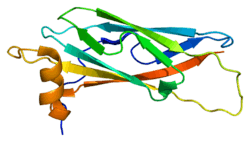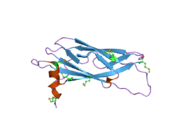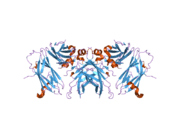VAPA
Vesicle-associated membrane protein-associated protein A is a protein that in humans is encoded by the VAPA gene.[5][6][7] Together with VAPB it forms the VAP protein family.
The protein encoded by this gene is a type IV membrane protein. It is present in the plasma membrane and intracellular vesicles. It may also be associated with the cytoskeleton. This protein may function in vesicle trafficking, membrane fusion, protein complex assembly and cell motility. Alternative splicing occurs at this locus and two transcript variants encoding distinct isoforms have been identified.[7]
Interactions
VAPA has been shown to interact with OSBP.[8] This interaction is mediated by the FFAT motif in OSBP.
References
- 1 2 3 GRCh38: Ensembl release 89: ENSG00000101558 - Ensembl, May 2017
- 1 2 3 GRCm38: Ensembl release 89: ENSMUSG00000024091 - Ensembl, May 2017
- ↑ "Human PubMed Reference:".
- ↑ "Mouse PubMed Reference:".
- ↑ Nishimura Y, Hayashi M, Inada H, Tanaka T (Feb 1999). "Molecular cloning and characterization of mammalian homologues of vesicle-associated membrane protein-associated (VAMP-associated) proteins". Biochem Biophys Res Commun. 254 (1): 21–6. PMID 9920726. doi:10.1006/bbrc.1998.9876.
- ↑ Weir ML, Klip A, Trimble WS (Sep 1998). "Identification of a human homologue of the vesicle-associated membrane protein (VAMP)-associated protein of 33 kDa (VAP-33): a broadly expressed protein that binds to VAMP". Biochem J. 333 (2): 247–51. PMC 1219579
 . PMID 9657962. doi:10.1042/bj3330247.
. PMID 9657962. doi:10.1042/bj3330247. - 1 2 "Entrez Gene: VAPA VAMP (vesicle-associated membrane protein)-associated protein A, 33kDa".
- ↑ Wyles, Jessica P; McMaster Christopher R; Ridgway Neale D (Aug 2002). "Vesicle-associated membrane protein-associated protein-A (VAP-A) interacts with the oxysterol-binding protein to modify export from the endoplasmic reticulum". J. Biol. Chem. United States. 277 (33): 29908–18. ISSN 0021-9258. PMID 12023275. doi:10.1074/jbc.M201191200.
Further reading
- Lapierre LA, Tuma PL, Navarre J, et al. (1999). "VAP-33 localizes to both an intracellular vesicle population and with occludin at the tight junction.". J. Cell. Sci. 112 (21): 3723–32. PMID 10523508.
- Tu H, Gao L, Shi ST, et al. (1999). "Hepatitis C virus RNA polymerase and NS5A complex with a SNARE-like protein.". Virology. 263 (1): 30–41. PMID 10544080. doi:10.1006/viro.1999.9893.
- Weir ML, Xie H, Klip A, Trimble WS (2001). "VAP-A binds promiscuously to both v- and tSNAREs.". Biochem. Biophys. Res. Commun. 286 (3): 616–21. PMID 11511104. doi:10.1006/bbrc.2001.5437.
- Wyles JP, McMaster CR, Ridgway ND (2002). "Vesicle-associated membrane protein-associated protein-A (VAP-A) interacts with the oxysterol-binding protein to modify export from the endoplasmic reticulum.". J. Biol. Chem. 277 (33): 29908–18. PMID 12023275. doi:10.1074/jbc.M201191200.
- Strausberg RL, Feingold EA, Grouse LH, et al. (2003). "Generation and initial analysis of more than 15,000 full-length human and mouse cDNA sequences.". Proc. Natl. Acad. Sci. U.S.A. 99 (26): 16899–903. PMC 139241
 . PMID 12477932. doi:10.1073/pnas.242603899.
. PMID 12477932. doi:10.1073/pnas.242603899. - Matsuda A, Suzuki Y, Honda G, et al. (2003). "Large-scale identification and characterization of human genes that activate NF-kappaB and MAPK signaling pathways.". Oncogene. 22 (21): 3307–18. PMID 12761501. doi:10.1038/sj.onc.1206406.
- Ota T, Suzuki Y, Nishikawa T, et al. (2004). "Complete sequencing and characterization of 21,243 full-length human cDNAs.". Nat. Genet. 36 (1): 40–5. PMID 14702039. doi:10.1038/ng1285.
- Gao L, Aizaki H, He JW, Lai MM (2004). "Interactions between viral nonstructural proteins and host protein hVAP-33 mediate the formation of hepatitis C virus RNA replication complex on lipid raft.". J. Virol. 78 (7): 3480–8. PMC 371042
 . PMID 15016871. doi:10.1128/JVI.78.7.3480-3488.2004.
. PMID 15016871. doi:10.1128/JVI.78.7.3480-3488.2004. - Evans MJ, Rice CM, Goff SP (2004). "Phosphorylation of hepatitis C virus nonstructural protein 5A modulates its protein interactions and viral RNA replication.". Proc. Natl. Acad. Sci. U.S.A. 101 (35): 13038–43. PMC 516513
 . PMID 15326295. doi:10.1073/pnas.0405152101.
. PMID 15326295. doi:10.1073/pnas.0405152101. - Suzuki Y, Yamashita R, Shirota M, et al. (2004). "Sequence comparison of human and mouse genes reveals a homologous block structure in the promoter regions.". Genome Res. 14 (9): 1711–8. PMC 515316
 . PMID 15342556. doi:10.1101/gr.2435604.
. PMID 15342556. doi:10.1101/gr.2435604. - Gerhard DS, Wagner L, Feingold EA, et al. (2004). "The status, quality, and expansion of the NIH full-length cDNA project: the Mammalian Gene Collection (MGC).". Genome Res. 14 (10B): 2121–7. PMC 528928
 . PMID 15489334. doi:10.1101/gr.2596504.
. PMID 15489334. doi:10.1101/gr.2596504. - Rual JF, Venkatesan K, Hao T, et al. (2005). "Towards a proteome-scale map of the human protein-protein interaction network.". Nature. 437 (7062): 1173–8. PMID 16189514. doi:10.1038/nature04209.
- Hamamoto I, Nishimura Y, Okamoto T, et al. (2005). "Human VAP-B is involved in hepatitis C virus replication through interaction with NS5A and NS5B.". J. Virol. 79 (21): 13473–82. PMC 1262604
 . PMID 16227268. doi:10.1128/JVI.79.21.13473-13482.2005.
. PMID 16227268. doi:10.1128/JVI.79.21.13473-13482.2005. - Kawano M, Kumagai K, Nishijima M, Hanada K (2006). "Efficient trafficking of ceramide from the endoplasmic reticulum to the Golgi apparatus requires a VAMP-associated protein-interacting FFAT motif of CERT.". J. Biol. Chem. 281 (40): 30279–88. PMID 16895911. doi:10.1074/jbc.M605032200.
This article is issued from
Wikipedia.
The text is licensed under Creative Commons - Attribution - Sharealike.
Additional terms may apply for the media files.








